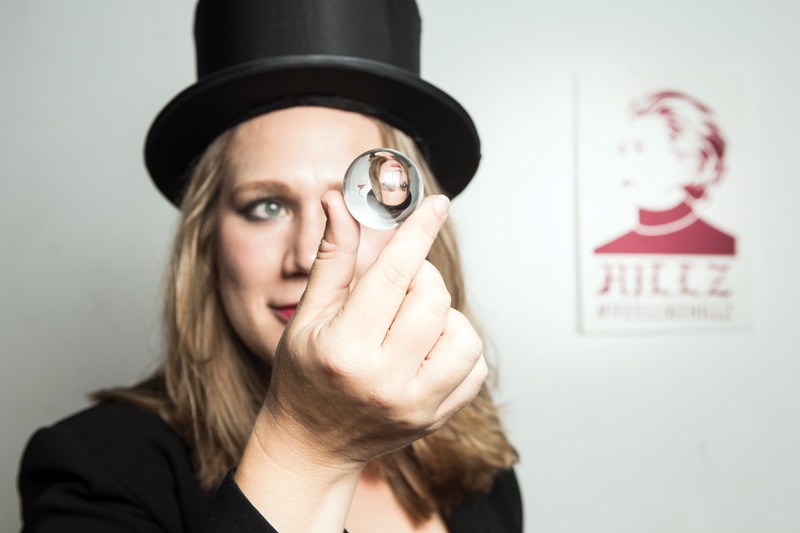Just Not That Woman, Vancouver Fringe Festival 2017 at the Firehall Arts Centre, 280 East Cordova Street, Vancouver. Sept. 8, 6:45 p.m., Sept. 9, 3 p.m., Sept. 11, 10 p.m., Sept. 13, 8:15 p.m., Sept. 15, 6:45 p.m., Sept. 16, 1:45 p.m. Tickets and Info: vancouverfringe.com.
For actor and playwright Ali Kennedy Scott, seeing the result of the 2016 presidential election in the U.S. was like having a giant rug pulled out from under her.
It’s a feeling she’s banking on many having experienced themselves, after those who put their hopes on presidential-nominee Hillary Clinton had that fantasy snatched away when the result swung in the opposite direction in the 11th hour.
It was a feeling, she says, that felt strangely akin to magic.
“I was supposed to be coming out celebrating the first female president of the United States. All the polls had said this was going to happen,” she says, adding that coming out into the world the next day was like entering an alternative reality, one where the promised narrative was broken and people had to face being duped by the sleight of hand of the century.
“It felt like this magic trick had been played because we had such certainty. All the polls had said one thing, however, what happened was a totally different thing,” she says.
Exactly how that magic trick was perpetuated – and what the con says about us as voters, consumers, and just people trying to get by in the world – is the topic of Scott’s new one-woman production.
Just Not That Woman is premiering at the Vancouver Fringe Festival Sept. 8.
It’s a show that Scott, who lives in Brooklyn, N.Y., but is originally from Australia, says she hopes audiences will walk away from with a greater curiosity about themselves.
“Basically, it’s using this election, this election result, this election campaign as a jumping off point to examine issues of implicit bias, in all aspects,” she explains.
Drawing from interviews with psychologists, scientists, and voters on all sides of the political spectrum, the play is divided into seven monologues featuring a diverse set of characters, such as an internet troll, a political data scientist, a non-voter, or a feminist academic.
All the while, the lead character – a magician – explains the ins and outs of the vocation – the stunning sleights of hand, the misdirection, the changing of the narrative.
“It’s a collage of different election experiences with this narration, our journey, through the world of magic,” she says.
The play takes a lot of text verbatim from Scott’s interview subjects, while other scenes involve spoken passages taken from a whole host of sources.
It’s not surprising, either, that Scott’s play draws on a milieu of different experts in a variety of fields – she has an affinity for the experiences of people and strives to understand the human experience.
Before fulfilling her dreams of dramaturgy at the Bristol Old Vic Theatre School in the U.K., Scott worked as a strategic business consultant in Sydney, Australia. Her background was in economics.
Although the fields may seem unrelated, Scott draws a parallel between the importance of understanding the world of people and business and theatre’s power to play on human experiences in an attempt to understand human behaviour.
“I actually think understanding how and why people engage with businesses, or how and why people engage with the world, is actually all the same desire to understand people,” she says. “It’s just that rather than present that in a PowerPoint, I’d prefer to engage with that on stage.”
Just Not That Woman is anything but dry and academic, however. This is a piece of theatre – not a lecture, Scott insists.
Her reverence for the solo-performance form of storytelling harkens back to her first solo production, The Day the Sky Turned Black, that tells the story of Australia’s notorious Black Saturday bushfires in 2009, when wildfires burned up more than one million hectares of land and killed almost 200 people.
“I find it absolutely fascinating to see a person transform into different characters, plus it’s a very intimate kind of experience,” she says.
The lived experience and title for her current play came quite quickly, paying homage to Clinton and the way she was perceived.
“There were a lot of comments and articles that would literally use the phrase ‘Just not that woman,’ where people would be saying, ‘I’m not sexist. I’d love a woman president – just not that woman.’ It was very curious to me just how common this was,” she says.



